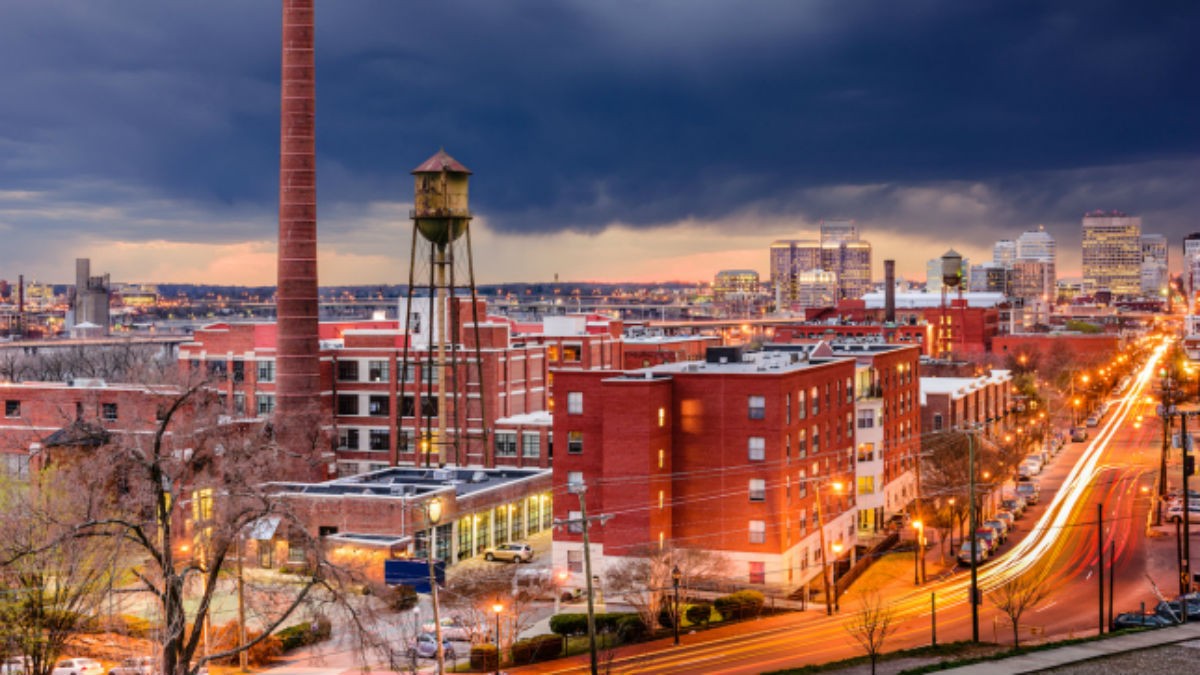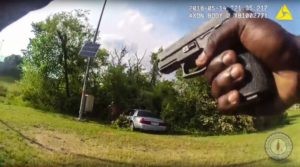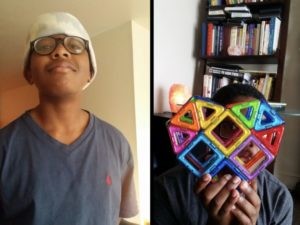Filed under: Analysis, Featured, Police, Repression, Southeast, White Supremacy

Report and analysis of the recent police shooting of Marcus-David Peters in Richmond, Virginia in a context of ongoing gentrification and police repression in the area.
Marcus-David Peters was murdered on May 14th, 2018, 364 days after the killing of Jaison Fitzgerald, a young father from the Southside of Richmond, shot in his car by a lone Richmond Police officer. Fitzgerald had earlier gotten into an emotional argument with his father-in-law, allegedly fired a gun in the air as he left, and drove to his niece’s house to calm down. RPD, supposedly lacking bodycam or dashcam footage of the incident, claimed he was killed in a shootout during a traffic stop upon leaving his niece’s house. Neighbors filmed police activity and gave interviews to local media questioning the police’s narrative.
 Why had a lone rookie confronted someone associated with a firearms violation rather than waiting for backup? Why was Fitzgerald found with a single bullet wound? Why did neighbors only hear one gunshot? Where was the gun? Why did local media refuse to investigate beyond parroting Richmond Police’s statements? Neighbors filming the immediate aftermath of the shooting experienced intimidation by police while recording. Their livestreams document real time attempts at censorship by police and condescending media crews who asked sympathetic questions before cutting out the vast majority of interviews with local witnesses. Jaison’s family have quietly held a funeral, an anniversary memorial service and a low intensity campaign for further answers from police despite almost no attention or followup from the local community.
Why had a lone rookie confronted someone associated with a firearms violation rather than waiting for backup? Why was Fitzgerald found with a single bullet wound? Why did neighbors only hear one gunshot? Where was the gun? Why did local media refuse to investigate beyond parroting Richmond Police’s statements? Neighbors filming the immediate aftermath of the shooting experienced intimidation by police while recording. Their livestreams document real time attempts at censorship by police and condescending media crews who asked sympathetic questions before cutting out the vast majority of interviews with local witnesses. Jaison’s family have quietly held a funeral, an anniversary memorial service and a low intensity campaign for further answers from police despite almost no attention or followup from the local community.
 Marcus-David Peters was murdered two months after a SWAT team violently ended a standoff with David Rios, a man known by police to have a history of self-harm in relation to interactions with police. In that incident, police approached him in his car while he was out buying a present for his daughter. After he fled and crashed in snowy conditions, an armored SWAT team wearing military fatigues surrounded him, told him there was “no escape” and then fired pepper spray and rubber bullets through his windows before shoving an attack dog into the car. David Rios shot himself in the chest as this was happening. The incident was captured in high definition, as was an interview with a wheelchair bound David Rios from prison. In that interview, after acknowledging his own mistakes in the situation, Rios expressed that his desire not to “give these people any more control over his life” led him to attempt suicide rather than allow himself to be taken into custody.
Marcus-David Peters was murdered two months after a SWAT team violently ended a standoff with David Rios, a man known by police to have a history of self-harm in relation to interactions with police. In that incident, police approached him in his car while he was out buying a present for his daughter. After he fled and crashed in snowy conditions, an armored SWAT team wearing military fatigues surrounded him, told him there was “no escape” and then fired pepper spray and rubber bullets through his windows before shoving an attack dog into the car. David Rios shot himself in the chest as this was happening. The incident was captured in high definition, as was an interview with a wheelchair bound David Rios from prison. In that interview, after acknowledging his own mistakes in the situation, Rios expressed that his desire not to “give these people any more control over his life” led him to attempt suicide rather than allow himself to be taken into custody.
Marcus-David Peters was murdered eight days after the brutal assault of McKhyl Dickerson, a 14 year old boy with autism and an auditory processing disorder, and his uncle Kerry Lewis, for playing in the vicinity of a hit-and-run. Officers approached the pair and accosted Kerry who told his nephew to go home. RPD then followed McKhyl home, slamming him into his own wall, and then beating and handcuffing him in front of his grandmother. All of this occurred as she begged them to stop, desperately explaining her grandson’s inability to comprehend why he was being followed and assaulted. Despite assurances from RPD that the incident is being investigated, little has been heard and local mainstream media have failed to follow up or challenge the Richmond Police Department’s flagrant assault on a child with special needs. The details of this incident were documented in a report by RVAmag.
All three of these incidents are far from isolated, having occurred within a calendar year of this latest death. All of them share several central themes, the most glaring being police initiated physical confrontations with people of color in the midst of mental and emotional crises or misunderstandings. They also stand in contrast to eerily similar confrontations with white people in which the individual in crisis was taken into custody alive, most recently in Fishersville, VA where a naked white man on methamphetamine managed to assault and bite a police officer at a Sheetz before being taken into custody. The similarities in circumstance between this incident and the shooting of Marcus-David Peters are truly remarkable, the exception being that Marcus-David Peters didn’t actually assault an officer, and only began to approach police after having a pistol and a taser drawn on him.
 2017 use of force incidents. Source: RPD website
2017 use of force incidents. Source: RPD website
The Richmond Police Department has for years now made a concerted effort to portray themselves as a model for “community policing.” They make heavy use of photo ops, issue carefully crafted press statements and stress the racial diversity of their officers. This fantasy however is overshadowed by the cynical reality of their conduct and function in the city. The daily interaction faced by Richmonders living in public housing and neighborhoods deemed “targeted enforcement zones” is defined by surveillance, intimidation and segregational harassment. Here, RPD’s facade is eclipsed by snatch squads, random intimidation and extortion.
This behavior has only gotten worse as the city experiences a massive wave of state-sanctioned predatory gentrification. Block after block of historically low income and black neighborhoods have become peppered with “we buy houses for cash!” signs and choked with industrial dumpsters, scowling county contractors and fat bellied men in ties strolling across people’s yards. The police’s behavior has also changed. A street that might have waited twenty or forty minutes for a 911 response now has regular patrols, lit streets, repaired potholes and two divergent types of interaction with police. Young white parents in newly renovated houses experience a warm and neighborly police force, eager to engage with children and pets. Meanwhile, a few blocks away, patrol cars drive slowly down alleys with their spotlights trained on black teenagers and enforce curfew and alcohol restrictions in parks that for years have stood at the center of these communities.
That is to say nothing of RPD’s massively expanded coordination with other police forces. This can take multiple forms, from convergent neighborhood patrols with local real estate leviathan Virginia Commonwealth University’s enormous armed campus force, to tipping off the ICE collaborators in Chesterfield’s highway departments to undocumented workers. Perhaps most alarmingly, RPD has stepped back from their historically tolerant stance on public protest, making way for Virginia’s hyper-militarized state police force. VA State Police, in particular, have massively increased their visibility within the city, their armored vehicles and AR-15 toting officers have gone from a rarity to an almost guaranteed occurrence during public demonstrations. RPD and Virginia State Police have also engaged in unannounced militarized drills in low-income centers around Richmond, repeatedly resulting in the deaths of officers and civilians in ensuing violent confrontations.
Perhaps the most flagrantly disgusting act of violence against Richmonders by our city government and police forces in recent years occurred during the rolling heating crisis that affected over 1800 low-income people this past winter. The heating crisis, beginning as early as October and continuing on until February, was a direct result of willful neglect by the Richmond Housing Authority and municipal government. Concentrated in Richmond’s widely abused housing projects and on the street among Richmond’s houseless community, the city looked on as hundreds of families froze.
Relief efforts were left to religious communities, local radicals from the Leaders of the New South, the IWW and loose knit anarchist groups, who spent weeks coordinating and distributing emergency supplies to families and overcrowded houseless shelters. We all remember the cold, even if our well-heeled new neighbors do not. We remember the cold, even as winter gives way to the sweltering long summer days that define our city’s lifecycle.
What if this was your Son, Brother, Grandson, Uncle, Nephew, Friend, Mentor… would his killing be justified? pic.twitter.com/bWJFjdhjMc
— Justice and Reformation (@JusticeforMDP) May 29, 2018
So much more could be said about any of this, about all of this. The systems and patterns of violence, displacement and oppression that are apparent in our city are well known and well documented. What is perhaps most stomach churning about all of this is the sheer apathy of so many of our supposedly “progressive” new neighbors. We, as Richmonders, have endured decades, centuries of these patterns of abuse and violence. But something feels different about this wave of displacement and foreign power. We are not facing a single corrupt building project, or a single neighbor shivering in the cold, or a single horrific and public police execution. In a town with a history of tight-knit perseverance in the face of state and municipal corruption, neglect and violence, many of us feel more alone than ever. Our neighborhoods are not our own, our new neighbors are not our friends. Yet we continue to find each other in the space between it all.
Rest in Power Marcus-David Peters. We love you, we love your beautiful family, and we love this city. All Power to the People.






